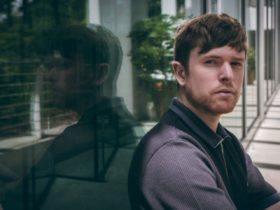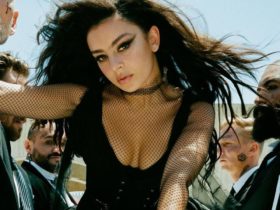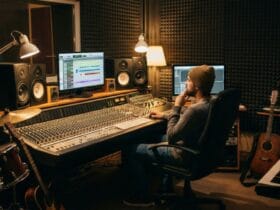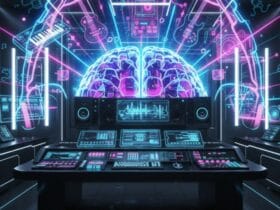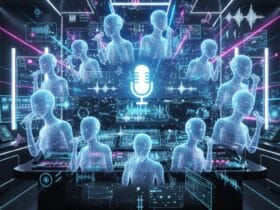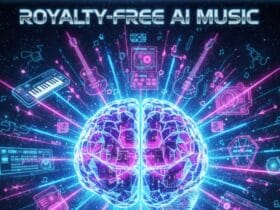Here we go, guys, in this article, we will be looking at how AI music is changing YouTube & streaming platforms in 2026. In just a few years, AI music has gone from a fun experiment to a full-blown revolution. On YouTube, Spotify, Deezer, and other streaming platforms, AI-generated tracks are everywhere:
- lo-fi beats made by neural networks
- AI cover songs mimicking real artists’
- background music created in seconds for vlogs and streams
But with this wave of innovation comes a big question:
- Who owns AI music?
- Can you get a copyright strike for using it?
- How are platforms detecting AI tracks?
Welcome to 2026, where AI music streaming, AI copyright on YouTube, and tools like Deezer’s AI detection systems are rewriting the rules.
The Explosion of AI Music on YouTube & Streaming
Between 2023–2026, the rise of:
- text-to-music models
- AI vocal clones
- “type beat” generators
turned content creation into a music buffet.
Today, creators can:
- Generate a full track in under a minute
- Clone a vocal style or vibe
- Make endless background music for vlogs, tutorials, and gaming streams
For YouTubers and streamers, this was a dream:
- No more hunting royalty-free tracks
- No more paying high licensing fees
- No more copyright claims (at least in theory…)
But then the platforms caught up.
AI Copyright on YouTube: What’s Actually Happening?
YouTube has one big job: protect rights holders and keep the platform safe for creators.
In 2026, three big AI-related copyright issues dominate YouTube:
1. AI Covers of Famous Artists
Creators started uploading:
- “AI Drake singing my lyrics”
- “AI Arijit Singh cover of my original song”
- “What if Taylor Swift sang this K-pop hit?”
These often use the recognizable voice style of real artists, which raises:
- Right of publicity issues
- Label and publisher complaints
- Moral and ethical debates
Result? Many AI vocal covers are now being:
- flagged, demonetized, or removed
- blocked in some regions
- claimed by rights holders if the underlying song is copyrighted
Even if you made the instrumental, the AI voice “impersonation” itself can create problems.
2. AI Music That Sounds “Too Similar” to Popular Tracks
Some AI tools unintentionally generate music that mimics:
- chord progressions
- melodies
- arrangement patterns
Even if the track is “AI original,” Content ID or manual claims can still happen if it resembles existing copyrighted works.
This is where it gets tricky:
AI may not “copy” directly, but its training data and outputs can feel derivative enough to trigger concern.
3. Misuse of “Royalty-Free AI Music”
Many sites claim:
“Use our AI music – copyright free, no problem!”
But creators forget to:
- Read licensing terms
- Check whether commercial usage is allowed
- Verify if the platform keeps ownership
So yes, even “AI music” can cause copyright issues if the license doesn’t match your use (especially on monetized channels).
Deezer’s AI Detection & the New “AI Label” Era
Streaming platforms like Deezer have started rolling out AI detection tools that can:
- Identify whether a track is likely AI-generated
- Detect AI vocals imitating real singers
- flag suspicious streaming behavior (bot plays, fake artists)
Why?
Because streaming is now flooded with:
- low-effort AI spam tracks
- mass-uploaded AI playlists made just to farm royalties
- imitation songs mimicking big artists for search hijacking
Deezer’s AI detection-style systems (and similar efforts across the industry) are built to:
- protect real artists
- keep catalog quality high
- avoid “AI noise” drowning genuine creativity
We’re entering an era where platforms might literally label tracks as “AI-assisted” or “AI-generated.”
Case Study 1: AI Track That Got Flagged on YouTube
Imagine this scenario (based on real patterns creators are reporting):
- A creator uploads a chill R&B song with an AI-generated vocal that sounds very close to a famous artist.
- The lyrics and melody are original, but the voice gives “this sounds like [famous singer]” vibes.
- A label or rights holder files a claim for “voice likeness” and brand usage.
Result:
- Video gets limited ads or full demonetization
- Creator is forced to change the vocal or remove the track
- Debate starts: Is voice style protected like a trademark?
This type of case is shaping new copyright norms around AI singers.
Case Study 2: AI Background Music & Content ID Confusion
Another pattern:
- A YouTuber uses AI-generated background music from an online tool labeled “royalty-free.”
- Months later, they start getting Content ID claims from a third-party label.
- The label has registered a similar AI track or purchased rights from the same generator.
Now:
- The creator must dispute manually
- Prove they had a legitimate licence
- Sometimes end up muting, replacing, or re-uploading videos
Lesson: Even in the age of AI music streaming, paperwork still matters. Save your licenses.
How AI Is Changing the Sound of Streaming Platforms
Beyond copyright, AI is transforming what we actually hear on platforms.
1. Streaming Catalogs Are Filling with AI-Generated Tracks
On platforms like Spotify, Deezer, and Apple Music, you’ll find:
- AI lo-fi playlists
- AI “focus” or “study” music
- AI ambient soundscapes
- AI-generated mood playlists
Some are openly labeled. Others are quietly mixed in.
It raises questions like:
- Should listeners know whether AI vs humans?
- Does it matter if music is AI-made if it sounds good?
2. Algorithm Favouring “Function Music”
AI-generated music works perfectly for:
- study playlists
- sleep tracks
- meditation
- white noise
- ambient mood playlists
These don’t require “celebrity appeal” — they require consistency and mood. AI can generate 100 such tracks in a day.
So streaming algorithms increasingly push AI-generated music in non-artist-branded playlists. Good for platforms. Difficult for small human artists trying to compete for space.
3. Hyper-Personalized AI Soundtracks
AI now lets platforms:
- analyze listener emotion, habits & location
- generate on-the-fly soundtracks for certain moments
- create unique variations per user
Imagine:
- Your “chill evening playlist” is partially generated for you only
- No one else has the same track version
This is the new frontier of AI music streaming personalization.
What This Means for YouTubers & Streamers
If you’re a YouTuber, gamer, vlogger, or streamer, AI music is both a superpower and a minefield.
Advantages:
- Cheap or free background tracks
- Infinite unique music (no repeats across videos)
- No need to dig through 100s of royalty-free sites
- Can match mood exactly to your niche (tech, travel, gaming, finance, etc.)
Risks:
- Using AI vocals that mimic big artists → potential flag
- Relying on “free” sites without reading licences → future claims
- Platform rules changing → past uploads suddenly under review
Practical Tips to Use AI Music Safely in 2026
- Use Reputable AI Music Platforms
Choose platforms that clearly state:- “royalty-free for YouTube & commercial use”
- no hidden resale or exclusive clauses
- Download & Save License Proofs
Always save:- invoices
- license pages
- screenshots of terms at the time of download
- Avoid Voice Cloning of Real Artists
Even if tools allow it, don’t use clones of famous voices.
Build your own AI vocal style or use neutral, original-sounding voices. - Label AI Use When Possible
For transparency and future-proofing, consider mentioning in descriptions: “Background music generated using AI tools with a valid commercial license.” - Stay Updated on YouTube & Streaming Rules
Platforms keep updating terms around AI — especially around:- AI copyright
- deceptive content
- metadata and labeling
The Future: AI Detection, AI Labels & Hybrid Music
By late 2026, we’re likely going to see:
- Standard labels on tracks: “AI-assisted” or “AI-generated”
- Tighter Deezer-style AI detection to block spam & fake artist profiles
- Tools for human artists to prove originality even in AI-heavy environments
- New genres that proudly call themselves AI-human hybrid music
AI isn’t going away.
The challenge now is how to keep it fair, legal, and creative.
The Conclusion: Adapt, Don’t Panic
AI music has changed streaming forever. Some see it as a threat. Others see it as a tool.
For YouTubers, streamers, and independent artists, the winners will be those who:
- Use AI smartly
- respect licenses
- build a brand that’s more than just “AI noise”
- Stay human in their storytelling, personality, and community
Because no matter how advanced AI becomes, it can’t replace your story, your face, your presence.
The platforms may get stricter.
Detection may get smarter.
But creators who adapt will always find a way to be heard.


